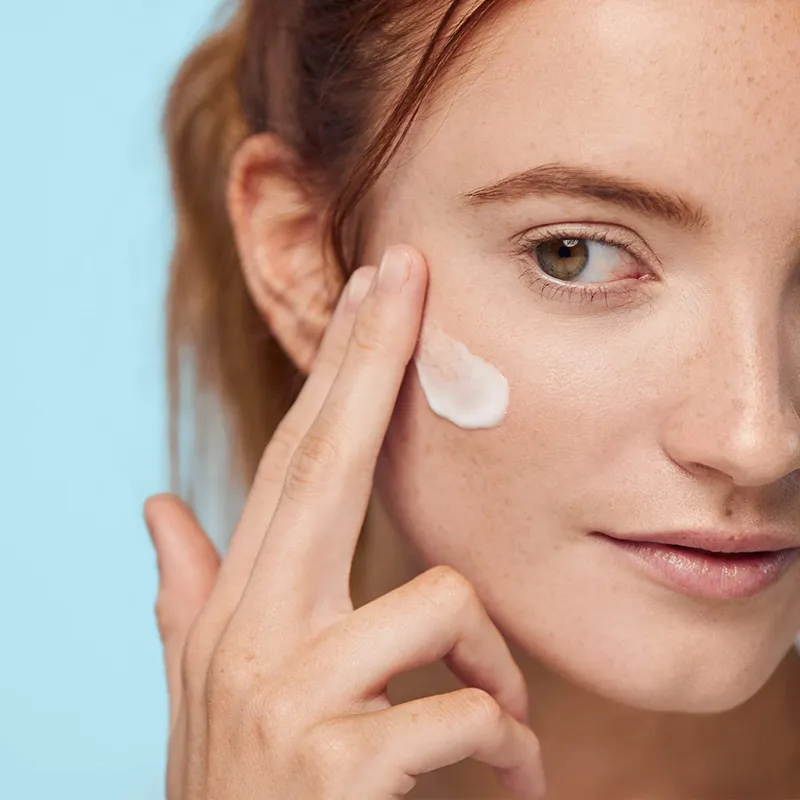
Summer is a season full of energy and enthusiasm, but it also brings unprecedented challenges to our skin. High temperature, humidity, strong ultraviolet rays, these environmental factors work together to make the skin face many problems such as oiliness, acne, sunburn, sensitivity, etc. How to enjoy the summer sun while still maintaining the health and beauty of the skin?
This is exactly the focus of our discussion today. This guide will deeply analyze the physiological changes of summer skin and provide scientific and practical summer skin care strategies to help you easily deal with summer skin care problems and make your skin glow with confidence throughout the summer season.

During the hot summer, the physiological mechanisms of the skin will undergo a series of significant changes to adapt to the external environment. Understanding these changes is the basis for developing an effective skin care strategy.
As the temperature rises in summer, the temperature of the skin surface also rises. In order to dissipate heat, capillaries expand and blood circulation speeds up, which may cause the skin to become red. For sensitive skin, it is more likely to cause flushing and irritation.
At the same time, high temperatures will also stimulate the secretion of sebaceous glands, causing the skin to produce more oil. Especially for oily and combination skin, the T zone (forehead, nose, chin) will become more greasy, and the pores may appear larger.
The intensity of ultraviolet rays (UVA and UVB) in summer sunlight is significantly increased, which is one of the main culprits causing skin problems. UVA can penetrate deep into the skin, destroy collagen and elastic fibers, accelerate skin aging, and cause fine lines, wrinkles and sagging.
UVB mainly acts on the surface of the skin, causing sunburn, erythema, peeling, and stimulates the production of melanocytes, leading to the formation of tanning and spots. Long-term exposure to ultraviolet rays also increases the risk of skin cancer. Therefore, sun protection is the top priority in skin care in summer season.
In summer, in order to maintain body temperature balance, the human body secretes a lot of sweat glands, and the amount of sweat increases significantly. Sweat contains salt, lactic acid, and urea, which stay on the surface of the skin for a long time, which may irritate the skin and cause itching or eczema. At the same time, as mentioned above, high temperature stimulates the sebaceous glands, leading to increased oil secretion.
The mixture of sweat and oil can easily clog pores and provide a breeding ground for bacteria, thus causing acne and other problems. Therefore, effective cleaning and oil control are an indispensable part of summer skin care.
By understanding the changes in summer skin, we can develop a more targeted skin care strategy. The following are the core principles that form the cornerstone of a complete summer skin care routine.
Sunscreen is the "golden rule" of summer skin care. Whether it is sunny or cloudy, ultraviolet rays are everywhere. Choose a broad-spectrum sunscreen (protects both UVA and UVB), with an SPF value of 30 or above and PA+++ or above. When doing outdoor activities, SPF50+/PA++++ is a better choice. Reapply every 2-3 hours, especially after sweating or swimming. In addition to applying sunscreen, physical sunscreen (such as parasols, sun-proof clothing, hats, and sunglasses) is equally important and can provide more comprehensive protection.
The skin produces a lot of oil in summer, but excessive cleansing will damage the skin barrier, causing an imbalance of water and oil, and even stimulate the sebaceous glands to secrete more oil. It is recommended to choose a mild, amino acid-based cleansing product and cleanse once in the morning and evening every day.
For oily skin, the frequency of cleansing can be appropriately increased, but avoid using strong degreasing cleansing products. Regular deep cleansing (such as using mud masks or cleansing masks) helps remove dirt and excess oil in the pores, but the frequency should not be too high, 1-2 times a week is enough.
Many people think that they don’t need moisturizing in summer because their skin is oily. This is a misunderstanding. Oily skin and lack of water are two different things. The skin loses moisture quickly in summer, and air-conditioned rooms and ultraviolet rays will aggravate moisture evaporation.
Choose refreshing, non-greasy moisturizing products, such as gel, lotion or gel texture, which contain moisturizing ingredients such as hyaluronic acid and glycerin, which can effectively replenish moisture and maintain the skin's hydration balance. Adequate moisture not only makes the skin look fuller, but also helps regulate oil secretion.

Although summer skin care has common core principles, different skin types have different care focuses in summer. To find the best summer skin care plan, you need to adjust it according to your skin type.
The biggest challenge for oily skin in summer is strong oil secretion and clogged pores. It is recommended to use oil-control cleansing products with toners containing ingredients such as salicylic acid and fruit acid to help unclog pores and inhibit acne. For moisturizing products, choose refreshing gel or lotion, and avoid using heavy creams. You can use a cleansing mask 1-2 times a week to deeply cleanse pores.
Although dry skin produces less oil in summer, it still needs to pay attention to sun protection and moisturizing. Choose gentle and moisturizing cleansing products to avoid over-cleansing. For moisturizing products, you can choose lotions or creams containing ingredients such as ceramides and squalane to lock in moisture. Even in summer, avoid staying in air-conditioned rooms for a long time to avoid aggravating skin dryness.
Combination skin is characterized by oily T-zone and dry cheeks. Skin care should be divided into different areas. Oil-control products can be used in the T-zone, while moisturizing should be focused on the cheeks. Choose mild cleansing products to avoid irritation. You can try using products with different textures, such as refreshing gel for the T-zone and moisturizing lotion for the cheeks.
Sensitive skin is more susceptible to irritation in summer, so gentleness is the first principle. Choose fragrance-free, alcohol-free, and pigment-free skin care products, and avoid using products with irritating ingredients. Choose physical sunscreen or wear a hat or umbrella for sun protection.
The water temperature should not be too high when cleaning, and friction should be avoided. When the skin becomes red, itchy, or other discomforts occur, stop using irritating products immediately and seek professional medical advice.
Choosing the right products is the key to building a summer skin care system. Here are some suggestions to help you make wise choices among the dazzling array of products.
In the process of pursuing summer skin care tips, we often fall into some misunderstandings, which are counterproductive.
In summer, the skin is oily, and many people wash their faces frequently, and even use products with too strong cleansing power, thinking that this can wash away the oil. However, excessive cleansing will damage the skin's natural barrier, causing dry and sensitive skin, and even stimulate the sebaceous glands to secrete more oil, falling into a vicious cycle.
It is another common misunderstanding to think that the skin is not dehydrated in summer and ignore moisturizing. High temperature, ultraviolet rays, and air-conditioned rooms will accelerate the loss of skin moisture, causing the skin to be dry inside and oily outside, and even fine lines. Refreshing moisturizing products are equally important in summer.
Building a perfect summer skin care routine is not something that can be done overnight. It requires us to understand our skin type, choose the right products, and stick to the right skin care habits.
As a skin care manufacturer with many years of development experience, I emphasize that summer skin care should be based on the principles of "simple, refreshing, and efficient". When choosing products, give priority to products with simple ingredients and clear effects. At the same time, maintaining healthy living habits, such as adequate sleep, a balanced diet, and moderate exercise, is also crucial to skin health. If there are serious skin problems, you should consult a dermatologist in time and do not blindly deal with them on your own.
In short, the best summer skin care is not to pursue oil control blindly, but to find a balance between cleansing, sun protection and moisturizing. Remember the following points to keep your skin in the best condition in summer:
I hope this summer skin care guide can help you have healthy and beautiful skin in the hot summer and greet every sunny day with confidence!


